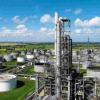Dear Sir
I want to calculate efficiency of centrifugal compressor compressing natural gas from 26 kg/cm2 to 57 kg/cm2 . For that i can calculate Cp but Cv value formula is not avialable with me to get k value. Can any body tell me how to get Cv value with respect to diff pressure & temp condition for natural gas?
|
|
How To Find Specific Heat At Constant Volume?
Started by bdabhi, Jan 23 2011 01:49 PM
2 replies to this topic
Share this topic:
#1

Posted 23 January 2011 - 01:49 PM
#2

Posted 23 January 2011 - 03:19 PM
Bdabhi:
I have to assume you have done all your thermodynamic “homework” with regards to fully understanding and being aware of what is taking place in this Unit Operation: you are compressing a gas (natural gas) in a centrifugal compressor (which involves a polytropic process).
If you have done all your thermo homework, then you are probably using the analytical equation for calculating the polytropic work of compression. I assume this inspite of the fact you haven’t cited what equation you are trying to apply, and you are trying to figure out the specific heats of the gas.
You should be aware of – or have already researched – the basis for the derivation of the equation you are using. I am willing to be that you are unaware of what temperature or pressure basis the “k” (Cp/Cv) values were based on. This is a common fault and oversight in most – if not all – thermodynamic textbook discussions regarding the work requirement for a gas compression. As a Chemical Engineering student you should also be aware that the specific heat values are dependent on the temperature and pressure of the system. But in a compression Unit Operation, WHICH temperature and pressure condition is the correct one to apply in selecting the Cp and Cv? Therefore, you have a more serious problem than just trying to figure out the specific heats for natural gas (a mixture of light hydrocarbons).
The way to resolve your problem is to find out the basis of the equation that you are proposing to use. That usually is difficult to do, because text books avoid discussing this type of “sticky” situation. They just assume that you already know that. The correct answer, in my experience, is that first you have to identify the composition of the gas mixture – or assume that the natural gas in your case is essentially pure methane. If the basis of pure Methane is acceptable, then you have resolved almost 76% of the problem. The other 25% is trying to establish the basis for the temperature and pressure of the specific heats. If you know (or can calculate) the discharge temperature, you can apply a simple arithmetic average to both. By going to the NIST thermodynamic data website (http://webbook.nist....hemistry/fluid/) you can find both the specific heats at the suction and discharge conditions. From that point on, it should be a no-brainer.
If you can’t treat your natural gas as methane and have to deal with it as a mixture, then you must apply the “mixing” laws that must have been taught to you. Text books such as Reid & Sherwood’s “The Properties of Gases and Liquids” explain what mixture laws exist and how to apply them to mixtures.
I hope that by reading my response you have become aware of how much basic data you have not shared with us since I have had to do a lot of assuming. I can’t divine or identify what basic information over this problem you have in your brain. It is your job to communicate that to us so that we can address the problem in an accurate and concise manner. But I hope what I have guessed is more or less accurate and can help you.
#3

Posted 23 January 2011 - 09:59 PM
bdabhi,
Please look at the link below. Good explanation about the specific heat ratio as well as a spreadsheet for calculating the specific heat ratio:
http://www.cheresour...0185#entry30185
Regards,
Ankur.
Please look at the link below. Good explanation about the specific heat ratio as well as a spreadsheet for calculating the specific heat ratio:
http://www.cheresour...0185#entry30185
Regards,
Ankur.
Similar Topics
Steam Pressure In Heat ExchangerStarted by Guest_mvanrijnbach_* , 15 Apr 2025 |
|

|
||
Heat Exchanger Steam FlowStarted by Guest_aliebrahem17_* , 25 Nov 2024 |
|

|
||
Discussion - Predict Storage Tank Heat Transfer Precisely By Jimmy D KStarted by Guest_raj shekhar_* , 25 Mar 2025 |
|

|
||
Cross Over Temperature In Countercurrent Heat ExchangerStarted by Guest_panoska_* , 18 Feb 2025 |
|

|
||
Aspen Hysys - Blowdown Utility Heat Flux MethodStarted by Guest_yuvi.ardekar1999@gmail.com_* , 27 Feb 2025 |
|

|

 FB
FB








